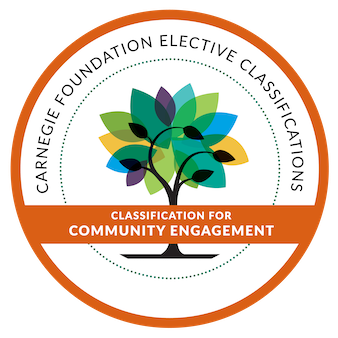Main Content

About the classification
The Carnegie Foundation’s Classification for Community Engagement is an elective classification, meaning it is based on voluntary participation by institutions. The elective classification involves a self-study with data collection and documentation of important aspects of institutional mission, identity and commitments, and requires substantial effort invested by participating institutions.
It is an institutional classification; it is not for systems of multiple campuses or for part of an individual campus. The classification is not an award. It is an evidence-based documentation of institutional practice to be used in a process of self-assessment and quality improvement.
Documentation
In 2020, UW Tacoma was named a recipient of the Carnegie Community Engagement Classification, an elective designation that indicates institutional commitment to community engagement. This is a 5-year designation; therefore a re-classification application was prepared and submitted in April 2025 (for hopeful re-classification starting in 2026). The Carnegie Foundation’s Classification for Community Engagement is the Foundation’s only elective classification, meaning that it requires a voluntary application process by institutions. It is supplemental to the Foundation’s main category (UW Tacoma and Bothell are both M1 institutions; UW Seattle is an R1). UW Bothell, UW Seattle, and UW Tacoma will applying separately (though in coordination with each other) for the re-classification as required by the Foundation’s process.
How does the Carnegie Foundation define Community Engagement?
“Community engagement describes collaboration between institutions of higher education and their larger communities (local, regional/state, national, global) for the mutually beneficial exchange of knowledge and resources in a context of partnership and reciprocity.
The purpose of community engagement is the partnership of college and university knowledge and resources with those of the public and private sectors to enrich scholarship, research, and creative activity; enhance curriculum, teaching and learning; prepare educated, engaged citizens; strengthen democratic values and civic responsibility; address critical societal issues; and contribute to the public good.”
UW Tacoma recognizes the definition of community engagement developed by the Carnegie Foundation.
Why is UW Tacoma pursuing the Carnegie Community Engagement Classification for 2026?
In 2022, UW Tacoma reaffirmed its strategic plan which recognizes that the most successful UW Tacoma community partnerships are transformative and result in each partner achieving more together then they can alone. Our pursuit of the Carnegie Classification in 2020 (and intent to seek re-classification in 2026) is our way of acknowledging this fact and is both a means and an end. It is a means of becoming more intentional and systematic as an institution about how we develop community engagement infrastructure in alignment with national best practices, including institutional partnership strategy, faculty rewards, curricular integration, and assessment of outcomes for students, faculty, partners, and the institution. It is an end in that it enables us to become a visible member of a national learning community made up of institutions that share our commitment to community engagement.
In other words, it is a means to the end of ensuring that we actually practice what we say is “part of our DNA of being borne of an engaged community” and that we are consistently reflecting upon and improving our practice in collaboration with others.
How is the 2026 UW Tacoma application process being organized?
In October 2023, the Office of Community Partnerships and Chancellor Lange launched the 2026 Carnegie re-classification process by convening a gathering of faculty and staff who will contribute to the co-development of working groups (aligned by application sections), identify individuals and units who can respond to the re-application questions, and eventually write draft sections of the application. During Summer-Fall 2024, the Office of Community Partnerships team will consolidate the section drafts and begin substantive review, editing, and synthesizing of the application. During Autumn 2024 and Winter 2025, final application review and editing will then be completed with key support from community partner stakeholders. The final application is due on April 25, 2025.
Carnegie–Identified Institutional Motivations
- Institutional self-assessment — a way to bring the disparate parts of the campus together in a way that advances a cohesive and strategic agenda. At the same time it allows for the identification of promising practices that can be shared across the institution.
- Legitimacy — national public recognition for UW Tacoma’s teaching, scholarship, and service.
- Accountability — a way to demonstrate that the institution is fulfilling its vision and mission partnering and collaborating with our community partners for common good.
- Catalyst for Change — a tool for fostering institutional alignment for community-based teaching, learning, and scholarship.
- Institutional Identity — the classification is a way to clarify institutional identity and mission as an urban-serving institution.
